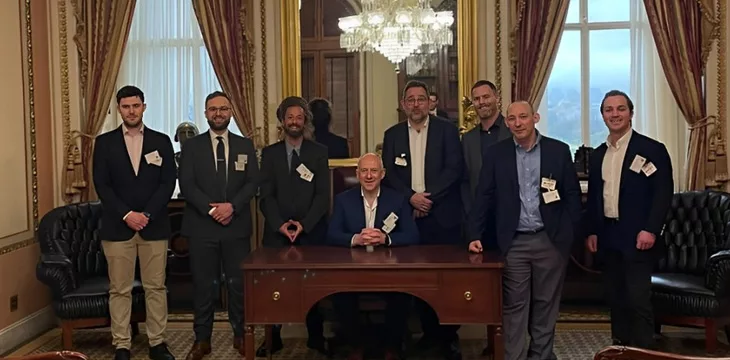The first-ever Capitol Hill Blockchain Demo Day in Washington, D.C., was a huge success, according to SmartLedger‘s Bryan Daugherty. The event gave blockchain industry representatives a unique opportunity to speak directly to policymakers at the highest levels, engaging on issues that matter most to them and the general public. It was an educational experience for participants on both sides of the fence, identifying key areas of concern and common interests.
Sponsored by the BSV Association, Demo Day was the result of two years’ worth of discussions and work with lawmakers and their staff. The aim was to showcase practical applications for enterprise blockchain technology in key industry sectors, including
agriculture and food safety, cybersecurity, and digital finance, as well as to highlight issues like data integrity and privacy, digital identity, and market regulation.
Excited to unveil an extraordinary roster of pioneering entrepreneurs at Capitol Hill for our inaugural blockchain demo day. This presents lawmakers with a unique chance to witness firsthand the revolutionary impact of scalable blockchain technology in advancing enterprise… pic.twitter.com/j52AhR52dW
— Bryan Daugherty (@BWDaugherty) March 27, 2024
The event featured presentations from several active entrepreneurs and companies within the blockchain industry. These included SmartGrow Agritech LLC, CertiHash, nChain, and
Tokenovate.
Speaking to CoinGeek, Daugherty described Capitol Hill Blockchain Demo Day as an “unprecedented opportunity” for policymakers to engage directly with enterprise-grade blockchain technology and the people driving its progress. He added that this also gave them a “glimpse into the future” that would assist them in identifying potential strategic advantages for those they represent.
Attendees “were very focused on the utility and the solutions we were demonstrating,” Daugherty said, dispelling the notion that policymakers are a decade or two behind in their knowledge of new technologies.
“The interest from policymakers was palpable, reflected not only in the attendance, which surpassed expectations with over 80 attendees against 54 RSVPs but also in their keen inquiries about the strategic opportunities these technologies could unlock for the country and their constituents.”
What technologies were on display?
Organizers identified companies working in key areas of national concern and areas in which the advantages of an efficient, enterprise-grade blockchain with unbounded scaling capacity could shine.
SmartGrow Agritech LLC showed how it leverages blockchain technology to empower farmers, especially in specialized sectors like orchards and vineyards that require precise production tracking. Food safety and traceability, sustainability, and resource-use efficiency were other areas in which blockchain could improve.
CertiHash explained its Sentinel Node cybersecurity detection assurance tool (the first of five applications based on the NIST cybersecurity framework). It could save millions of dollars by shortening response times to security breaches and by providing auditable records on file integrity and change monitoring.
nChain revealed its digital signature app nSign, which streamlines identity verification and makes documents tamper-proof in a secure and transparent way. Widespread use of the tool across different industries would increase trust and make workflows more efficient while protecting private/personal and secure information.
Finally, Tokenovate demonstrated its solutions for digital financial market infrastructure. These include asset tokenization and blockchain-driven smart contracts, promising efficiency benefits for the OTC derivatives market and other financial sectors, supporting legislative objectives aimed at financial market innovation and regulation, and promoting economic development through new technologies.
Capitol Hill Blockchain Demo Day was a “clear testament to blockchain’s potential and its readiness for broader adoption in both the public and private sectors,” Daugherty added. Furthermore, these direct interactions with policymakers would help guide the industry’s own attendees in developing and deploying new blockchain solutions.
Ultimately, it stressed the need for ongoing education and future collaboration between policymakers and the tech community. Trust between the two groups is essential, as is the trust end users and the public have in the technologies they use. So long as there is dialogue, the results will be more satisfactory to everyone involved.
Watch: Bryan Daugherty—Proof of ESG initiative through a sustainable blockchain
New to blockchain? Check out CoinGeek’s Blockchain for Beginners section, the ultimate resource guide to learn more about blockchain technology.


